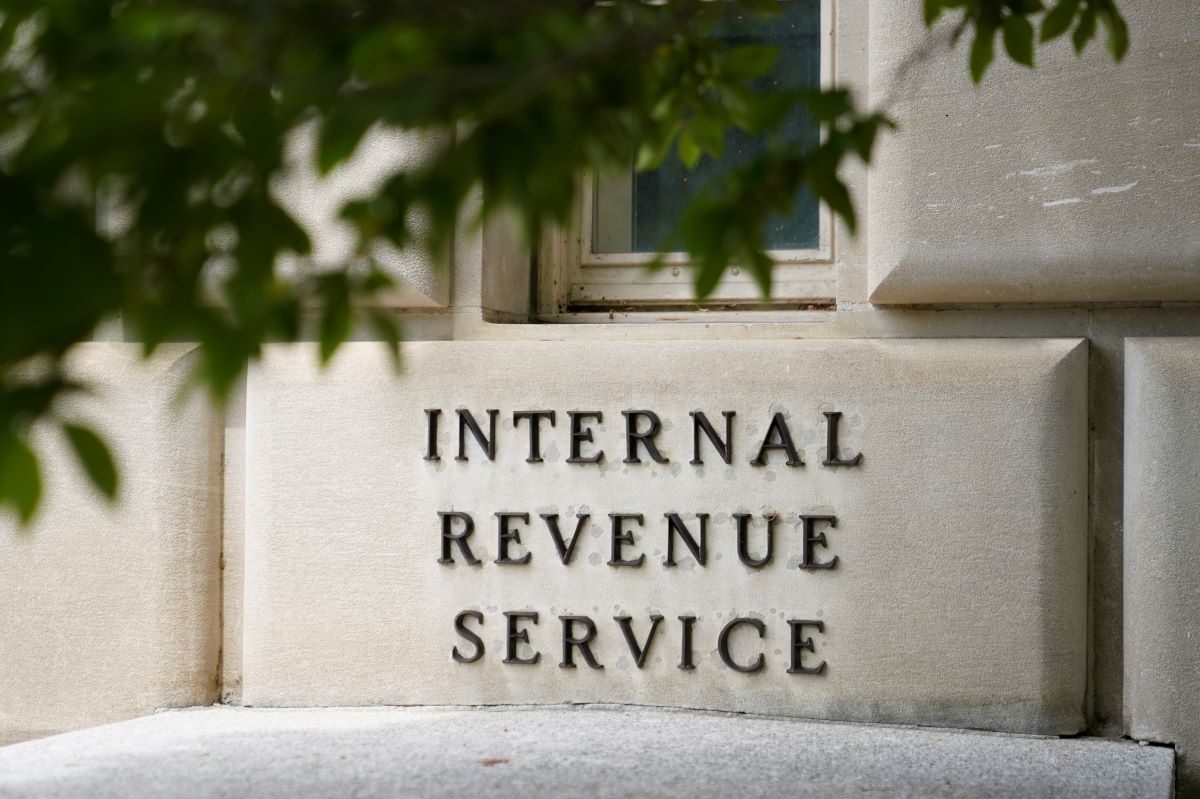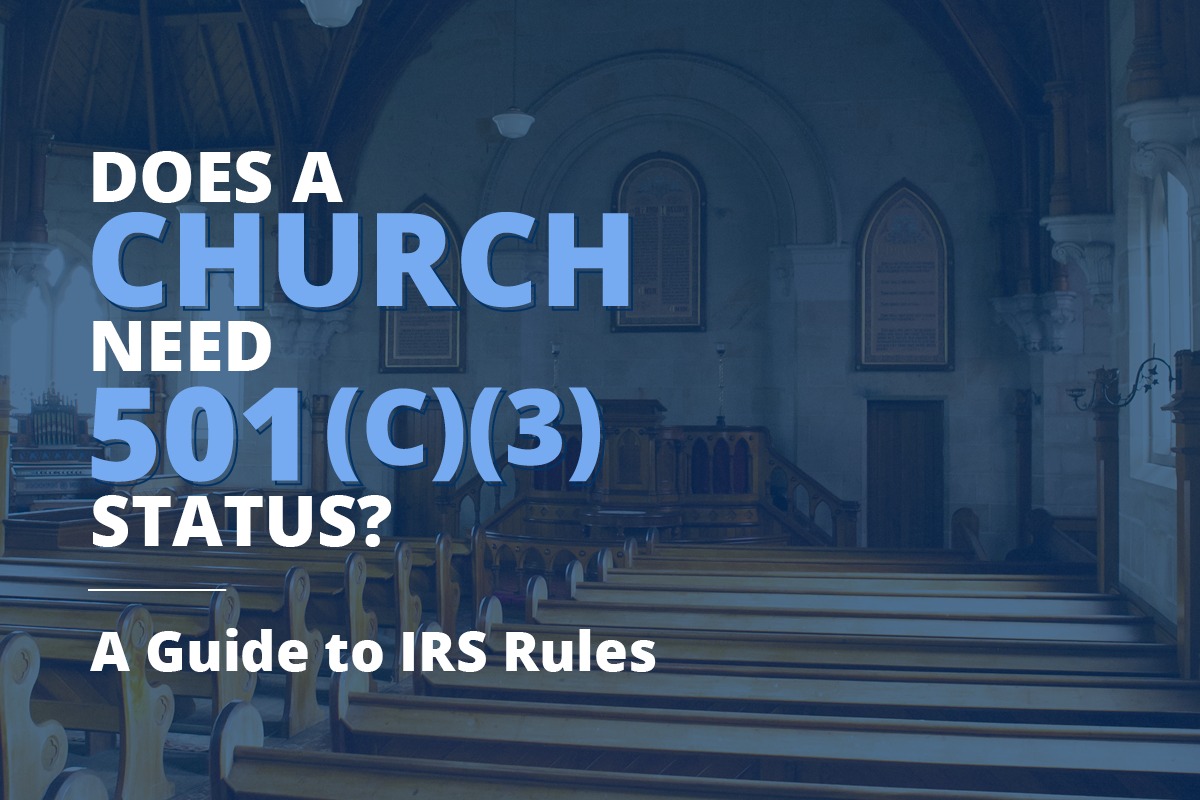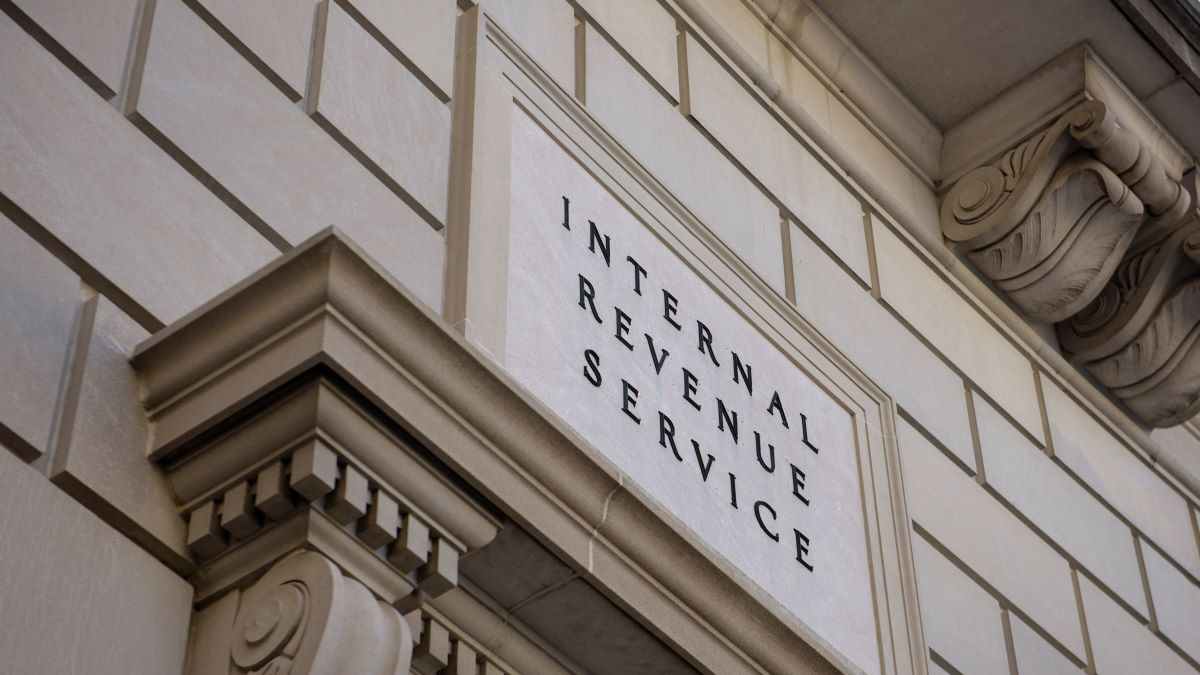Home>Finance>How Much Does It Cost To File A 501(C)3 With The IRS?


Finance
How Much Does It Cost To File A 501(C)3 With The IRS?
Published: October 31, 2023
Discover the cost of filing a 501(C)3 with the IRS and manage your finances effectively. Learn about the expenses involved and make informed decisions for your organization.
(Many of the links in this article redirect to a specific reviewed product. Your purchase of these products through affiliate links helps to generate commission for LiveWell, at no extra cost. Learn more)
Table of Contents
Introduction
Starting a nonprofit organization can be rewarding, but it also comes with its fair share of financial considerations. One important aspect of establishing a nonprofit is obtaining 501(c)(3) status from the Internal Revenue Service (IRS). This prestigious designation allows your organization to be exempt from certain federal taxes and provides eligibility for tax-deductible donations. However, before you can enjoy these benefits, you’ll need to navigate the process of filing for 501(c)(3) status.
In this article, we will dive into the costs associated with filing for 501(c)(3) status with the IRS. Whether you’re planning to launch a charitable foundation, a religious organization, an educational institution, or any other type of nonprofit entity, understanding the financial implications of obtaining 501(c)(3) status is crucial for effective financial planning.
While the actual cost may vary depending on the nature and complexity of your organization, we’ll provide you with a general overview of the expenses involved and offer tips on how to minimize them. By the end of this article, you’ll have a clear understanding of the financial commitments you’ll need to make when pursuing 501(c)(3) status.
What is a 501(c)(3) organization?
A 501(c)(3) organization is a type of nonprofit organization that is granted tax-exempt status by the Internal Revenue Service (IRS) under section 501(c)(3) of the U.S. Internal Revenue Code. This designation is specifically for organizations that are organized and operated for charitable, religious, educational, scientific, literary, or other similar purposes.
Being classified as a 501(c)(3) organization carries significant benefits. The most notable advantage is that it allows your organization to be exempt from federal income taxes. This means that any donations or revenue earned by your organization can be utilized entirely for your mission and programs, rather than being allocated towards taxes.
Another crucial benefit of 501(c)(3) status is the ability to offer tax deductions to donors. Contributions made to your organization can be tax-deductible for the donor, encouraging individuals and businesses to support your cause financially. This can greatly enhance your fundraising efforts and attract more support.
However, obtaining 501(c)(3) status is not automatic. To qualify, your organization must meet certain requirements set forth by the IRS. These requirements typically include operating exclusively for charitable purposes, limiting political campaign involvement, and ensuring that no private interests benefit substantially from the organization’s activities.
It’s important to note that 501(c)(3) status is separate from being incorporated as a nonprofit organization. While both designations are critical for operating as a nonprofit, obtaining 501(c)(3) status from the IRS is the crucial step that provides the tax-exempt status and fundraising advantages.
Overall, a 501(c)(3) organization is an essential legal and tax designation that allows nonprofit organizations to fulfill their mission and make a positive impact in their communities without the burden of excessive tax obligations.
Why do you need to file for 501(c)(3) status?
Filing for 501(c)(3) status with the IRS is a crucial step for any nonprofit organization. While it may require some upfront costs and effort, the benefits and opportunities it provides make it well worth the investment. Here are some compelling reasons why you need to file for 501(c)(3) status:
1. Tax Exemption
Perhaps the most significant advantage of obtaining 501(c)(3) status is the tax exemption it provides. As a tax-exempt organization, your nonprofit will be exempt from paying federal income taxes on any revenue generated. This means more funds can be allocated towards achieving your organization’s mission and supporting your programs.
2. Eligibility for Grants and Funding
Many foundations, corporations, and government agencies require nonprofit organizations to have 501(c)(3) status before they consider awarding grants or providing funding. Having this designation opens up a wider range of potential funding opportunities, allowing you to access resources that can further your organization’s work.
3. Legitimacy
Obtaining 501(c)(3) status adds credibility and legitimacy to your organization. Donors, volunteers, and the public at large often view tax-exempt status as a sign that an organization is committed to its mission and operates with transparency. This can help attract more support and build trust among stakeholders.
4. Tax-Deductible Donations
When individuals donate to a 501(c)(3) organization, their contributions are eligible for tax deductions. This can be a significant incentive for potential donors, as it allows them to support your cause while also receiving a financial benefit. Tax-deductible donations can greatly enhance your fundraising efforts and help you generate more support for your organization.
5. Exemption from Sales and Property Taxes
In addition to income taxes, many states also offer sales tax and property tax exemptions for 501(c)(3) organizations. This can result in substantial savings, especially if your nonprofit regularly makes purchases or owns property.
6. Enhanced Public Image
Being recognized as a 501(c)(3) organization provides a positive image in the eyes of the public. It demonstrates that your organization is committed to social good and adheres to strict standards of transparency and accountability.
Overall, filing for 501(c)(3) status offers numerous advantages that can help your nonprofit thrive and make a greater impact. While there may be costs and administrative requirements associated with the process, the benefits far outweigh the initial investment.
Understanding the costs of filing for 501(c)(3) status
Obtaining 501(c)(3) status for your nonprofit organization involves certain costs. While the exact expenses will vary depending on the complexity of your organization, here are some common costs to consider:
1. IRS Filing Fee
The primary cost associated with filing for 501(c)(3) status is the IRS filing fee. As of 2021, the fee can range anywhere from $275 to $600, depending on the size of your organization’s projected annual gross receipts over a four-year period. This fee is non-refundable, even if your application is denied, so it’s essential to ensure your organization meets the requirements before submitting your application.
2. Legal and Accounting Fees
Seeking the assistance of professionals, such as lawyers or accountants with experience in nonprofit law, can help ensure that your application is properly prepared and increase your chances of a successful outcome. The fees for their services will depend on various factors, including the complexity of your organization and the scope of work required. Obtaining legal and accounting advice can help you navigate the application process more effectively.
3. Document Preparation
Preparing the necessary documents for your application, such as the Articles of Incorporation and the bylaws, may require the assistance of a professional or specialized software. While DIY options are available, it is still important to allocate resources for document preparation to ensure accuracy and compliance with IRS guidelines.
4. Additional State Fees
In addition to the IRS filing fee, your organization may also need to pay state-specific fees associated with applying for state tax exemptions or registering as a charitable organization in your state. These fees can vary depending on the state requirements and the nature of your organization’s activities.
It is important to note that these costs are only associated with filing for 501(c)(3) status. There may be ongoing expenses related to the operation and compliance of your nonprofit, such as annual filings, taxes (other than federal income tax), fundraising costs, and administrative expenses. Budgeting for these costs is crucial for maintaining the financial health and sustainability of your organization.
While the costs of filing for 501(c)(3) status may seem significant, it’s important to view them as an investment in the long-term success of your nonprofit. The benefits and opportunities that come with tax-exempt status far outweigh the initial expenses, allowing your organization to focus on its mission and make a positive impact in the community.
Initial filing fees
When filing for 501(c)(3) status with the IRS, one of the primary costs to consider is the filing fee. The exact amount of the fee depends on your organization’s projected annual gross receipts over a four-year period. As of 2021, the fees for Form 1023, which is used for most organizations, are as follows:
- Organizations with projected annual gross receipts of $10,000 or less: $275
- Organizations with projected annual gross receipts exceeding $10,000: $600
It is important to note that these fees may change over time, so it’s essential to consult the latest IRS guidelines for the most accurate information.
The filing fee is typically paid when submitting Form 1023, the Application for Recognition of Exemption Under Section 501(c)(3) of the Internal Revenue Code. The fee is non-refundable, regardless of whether your application is approved or denied, so it’s crucial to ensure that your organization meets the requirements before submitting the application.
While the filing fee may seem like a significant expense, it is important to view it as an investment in the long-term success of your organization. Securing 501(c)(3) status provides numerous benefits, such as tax exemption and eligibility for grants, which can greatly enhance your organization’s ability to carry out its mission and make a positive impact in the community.
For organizations with limited financial resources, there may be options available to request a waiver of the filing fee. The IRS provides guidance on fee waivers and offers assistance to organizations that demonstrate financial need. It’s important to carefully review the criteria and procedures outlined by the IRS to determine if your organization may qualify for a fee waiver.
Additionally, it’s worth noting that the IRS provides an alternative streamlined application process for smaller organizations with projected annual gross receipts of $50,000 or less and total assets of $250,000 or less. The filing fee for this streamlined process is $275 as of 2021. This offers a more simplified and cost-effective option for eligible organizations.
Ultimately, the initial filing fee is a necessary expenditure to obtain 501(c)(3) status for your organization. While it may require some financial planning, it is an investment that can provide significant long-term benefits and opportunities for your nonprofit.
Additional costs and considerations
While the filing fee for obtaining 501(c)(3) status is a significant cost to consider, there are also additional expenses and considerations involved in the process. It’s important to be aware of these factors to ensure that your financial planning is comprehensive and accurate. Here are some additional costs and considerations to keep in mind:
1. Legal and Accounting Services
Seeking professional assistance from lawyers or accountants with expertise in nonprofit law is highly recommended. Their services can help ensure that your application is prepared accurately and in compliance with IRS regulations. While legal and accounting fees can vary depending on the complexity of your organization and the scope of work required, budgeting for these services is crucial to minimize potential errors and increase your chances of a successful application.
2. Document Preparation
Preparing the necessary documents for your application, such as the Articles of Incorporation, bylaws, and financial statements, may require the assistance of a professional or specialized software. Document preparation costs can vary depending on the complexity of your organization and whether you utilize professional services or opt for do-it-yourself options. Allocating resources for document preparation ensures that your application is accurate and compliant with IRS guidelines.
3. State-Specific Fees
In addition to the costs associated with filing for 501(c)(3) status with the IRS, consider any state-specific fees that may be required. Some states may have their own filing fees for state tax exemptions or charitable organization registrations. These fees vary from state to state, so it’s essential to research and understand the requirements in your particular state.
4. Ongoing Compliance Costs
Once your organization has obtained 501(c)(3) status, there will be ongoing compliance requirements and potential costs to consider. This can include annual filings, maintaining accurate financial records, filing required tax forms, and complying with state-specific regulations. It’s crucial to allocate resources and budget for ongoing compliance to maintain your organization’s tax-exempt status.
While these additional costs and considerations may require careful financial planning, they are essential investments in the long-term success and sustainability of your nonprofit organization. Seeking professional assistance, accurately preparing documentation, and ensuring ongoing compliance will contribute to the smooth operation of your organization and help you achieve your mission more effectively.
Tips for minimizing costs
While obtaining 501(c)(3) status involves certain expenses, there are several strategies you can employ to minimize these costs and make the process more affordable. Here are some helpful tips to help you reduce expenses when filing for 501(c)(3) status:
1. Research IRS Requirements Thoroughly
Before submitting your application, thoroughly research the IRS requirements for 501(c)(3) status. Understanding the eligibility criteria and ensuring that your organization meets all the necessary qualifications can help you avoid potential rejections or additional costs associated with reapplication.
2. Utilize Free Resources and Guidance
Take advantage of free resources and guidance provided by the IRS and other reputable nonprofit organizations. The IRS offers comprehensive information and instructions on their website, including sample documents and guidance on the application process. Additionally, nonprofit support organizations often provide free or low-cost resources to help organizations navigate the application process.
3. DIY Document Preparation
Consider preparing the necessary documents, such as the Articles of Incorporation and bylaws, yourself rather than relying on professional services. The IRS provides templates and guidelines for these documents on their website. By dedicating some time and effort, you can save money that would have otherwise been spent on document preparation services.
4. Explore Pro Bono Services
Some law firms and accounting firms offer pro bono services to nonprofit organizations. Reach out to local firms and inquire about pro bono opportunities. These professionals may be willing to assist with the filing process or provide guidance at a reduced or no cost.
5. Consider Fiscal Sponsorship
If your organization is in its early stages or has limited resources, you may want to explore fiscal sponsorship. Fiscal sponsorship involves partnering with an existing 501(c)(3) organization that will provide administrative and financial support on your behalf. This can help minimize the costs of filing for 501(c)(3) status as the fiscal sponsor takes on much of the administrative and compliance responsibilities.
6. Engage Volunteers and In-Kind Donations
Utilize the power of volunteers and in-kind donations to offset costs. Seek support from individuals or businesses who are willing to offer their services, such as legal or accounting expertise, at no charge. Additionally, consider accepting donated goods or services that can lower your operating expenses.
By implementing these tips, you can significantly reduce the costs associated with obtaining 501(c)(3) status. However, it is important to strike a balance between minimizing costs and ensuring the accuracy and compliance of your application. Always consult with professionals or seek guidance from reputable sources to ensure your organization meets all the necessary requirements.
Conclusion
Obtaining 501(c)(3) status for your nonprofit organization is an important step that comes with costs and considerations. However, the long-term benefits and opportunities that come with tax-exempt status make the investment worthwhile. By understanding the costs associated with filing for 501(c)(3) status and implementing strategies to minimize expenses, you can navigate the process more effectively and allocate resources wisely.
While the initial filing fee is a significant expense, it is a necessary investment in securing tax-exempt status for your organization. Additionally, there may be additional costs for legal and accounting services, document preparation, and state-specific fees. Ongoing compliance costs should also be factored into your financial planning.
To minimize costs, thoroughly research the IRS requirements, utilize free resources and guidance, consider DIY document preparation, explore pro bono services, and examine fiscal sponsorship possibilities. Engaging volunteers and accepting in-kind donations can also help offset expenses. By being proactive and strategic, you can navigate the filing process successfully while minimizing financial burdens.
Remember, obtaining 501(c)(3) status provides numerous benefits, including tax exemption, eligibility for grants, enhanced credibility, and the ability to offer tax-deductible donations. These advantages are vital for the sustainability and impact of your organization.
As you embark on the journey of filing for 501(c)(3) status, ensure that you are well-prepared, informed, and compliant with all the necessary requirements. Seeking professional guidance and support, utilizing available resources, and planning strategically will help you achieve your nonprofit’s mission more effectively and make a lasting difference in your community.














